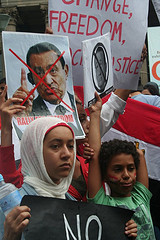If there is a face to the revolt that has sprouted in Egypt, it may be the face of Khaled Said.
Mr. Said, a 28-year-old Egyptian businessman, was pulled from an Internet cafe in Alexandria last June by two plainclothes police officers, who witnesses say then beat him to death in the lobby of a residential building. Human rights advocates said he was killed because he had evidence of police corruption.
The Egyptian police and security services have a well-earned reputation for brutality and snuffing out political opposition. But in Mr. Said, they unwittingly chose the wrong target.
Within five days of his death, an anonymous human rights activist created a Facebook page — We Are All Khaled Said — that posted cellphone photos from the morgue of his battered and bloodied face, andYouTube videos played up contrasting pictures of him happy and smiling with the graphic images from the morgue. By mid-June, 130,000 people joined the page to get and share updates about the case.
It became and remains the biggest dissident Facebook page in Egypt, even as protests continue to sweep the country, with more than 473,000 users, and it has helped spread the word about the demonstrations in Egypt, which were ignited after a revolt in neighboring Tunisia toppled the government there.
“There were many catalysts of the uprising,” said Ahmed Zidan, an online political activist marching toward Tahrir Square for a protest last week. “The first was the brutal murder of Khalid Said.”
The Tunisian rebellion was set off after a fruit vendor, Mohamed Bouazizi, burned himself to death after being humiliated by the police. His desperate act led to protests, which were recorded on mobile phones, posted on the Internet, shared on Facebook and eventually broadcast by Al Jazeera.
But Mr. Said’s death may be the starkest example yet of the special power of social networking tools like Facebook even — or especially — in a police state. The Facebook page set up around his death offered Egyptians a rare forum to bond over their outrage about government abuses.
“Prior to the murder of Khaled Said, there were blogs and YouTube videos that existed about police torture, but there wasn’t a strong community around them,” said Jillian C. York, the project coordinator for the OpenNet Initiative of the Berkman Center for the Internet and Society at Harvard University. “This case changed that.”
While it is almost impossible to isolate the impact of social media tools from the general swirl of events that set off the popular uprisings across the Middle East, there is little doubt that they provided a new means for ordinary people to connect with human rights advocates trying to amass support against police abuse, torture and the Mubarak government’s permanent emergency laws allowing people to be jailed without charges.
Facebook and YouTube also offered a way for the discontented to organize and mobilize — and allowed secular-minded young people to seize the momentum from Egypt’s relatively neutered, organized opposition.
Far more decentralized than political parties, the strength and agility of the networks clearly caught Egyptian authorities — and American intelligence analysts — by surprise, even as the Egyptian government quickly attempted to shut them down.









